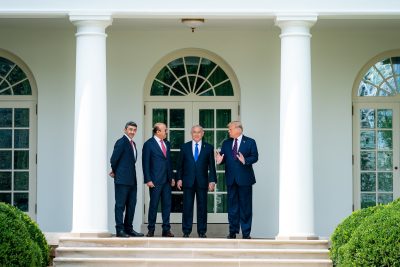Surprise! Arab Public Gives US Sponsored “Abraham Accords” a Big Thumbs Down
Support for Washington appears weak in the region, while attitudes toward Russia and Iran have shown steady improvement.

All Global Research articles can be read in 51 languages by activating the Translate Website button below the author’s name.
To receive Global Research’s Daily Newsletter (selected articles), click here.
Follow us on Instagram and Twitter and subscribe to our Telegram Channel. Feel free to repost and share widely Global Research articles.
***
Arab citizens across the Middle East and North Africa continue to view Israel and the United States as the primary threats to their country’s security, and opposition to normalization with the Jewish state remains high, according to the 2022 Arab Opinion Index released Thursday by the Arab Center for Research and Policy Studies in Qatar.
Approximately 80 percent of respondents said that U.S. and Israeli policies “threaten the security and stability of the region.” By contrast, 57 percent said the same about Iran and Russia, an almost 15-point improvement for both countries since 2016. Turkey and China were the only countries that earned a positive approval rating for their policies in the Arab world.
“There is a general sense of American hypocrisy on Middle East policy,” argued Dana El Kurd, a professor at the University of Richmond, at a press briefing about the findings. “There is a sense that there is a Middle East exception to this administration’s pro-democracy position.”
Respondents had a particularly dim view of U.S. policy on Palestine, with only 11 percent saying they approve of Washington’s positions. By comparison, 31 percent of those polled approved of Iranian policy toward the Palestinians, and 43 percent approved of Turkish policy.
The Arab Opinion Index survey includes data from largely in-person interviews with 33,000 respondents across 14 Arab countries. (Interviews with Saudi respondents took place over the phone.) The 2022 poll is the eighth since 2011, when the Arab Center launched the project. Interviewers posed a wide range of questions on democracy, politics, and the economy.
While the detailed poll results are only available in Arabic, Arab Center Washington DC published an executive summary of the survey in English. Countries polled included Algeria, Egypt, Iraq, Jordan, Kuwait, Lebanon, Libya, Mauritania, Morocco, Palestine, Qatar, Saudi Arabia, Sudan, and Tunisia.
When it comes to foreign policy, the results highlight the sharp disconnect between the citizens of Arab countries and their leaders, many of whom have begun to seek détente with Israel. While the poll found a significant shift in favor of normalization in Morocco and Sudan — both of which, along with the United Arab Emirates and Bahrain, have already established ties with Israel — the vast majority (84 percent) of all respondents opposed any form of diplomatic relations with Tel Aviv.
In Saudi Arabia, which Israel has considered the most important target for mutual recognition, only five percent of respondents said they favored normalization, while 38 percent said they were opposed, and 57 percent said they either didn’t know or declined to answer. Opposition was strongest in Algeria, Mauritania, Libya, Palestine, Jordan, and Tunisia where from 90 to 99 percent of respondents said they opposed normalization with the Jewish state.
U.S. policymakers should take this divide into consideration when they formulate policy for the region, argued Khalil Jahshan, the executive director of the Arab Center Washington DC.
“For countries that pride themselves on support for democracy, it behooves them to look at public opinion… to look at what the public really wants,” Jahshan said.
The vast majority of respondents expressed support for democratic governance, though 47 percent expressed concern that their country is “unprepared for democracy.”
While 80 percent of those polled viewed the Arab people as a single nation, the survey revealed sharp divides between Gulf states and the rest of the Arab world over economic issues.
Over 90 percent of Gulf citizens described their family’s economic situation as good or very good, as compared to 66 percent in North Africa and 50 percent in the Levant. Eighty-six percent of Gulf natives said their household income was enough to get by or save money, while nearly half of Levant citizens — including respondents from Jordan, Palestine, and Lebanon — said their income is not enough to cover daily costs.
Nearly three out of four (73 percent) respondents said their home country suffered from widespread corruption. In Lebanon, Tunisia, and Iraq, more than 90 percent of respondents reported extensive corruption, while in Qatar and Saudi Arabia less than 30 percent said the same.
Notably, the survey also found that 36 percent of respondents rely on online news as their primary source of information, a 31-point jump from 2011, when the question was first asked. Despite the interest in online news, 57 percent said they do not trust information circulated on social media.
*
Note to readers: Please click the share buttons above. Follow us on Instagram and Twitter and subscribe to our Telegram Channel. Feel free to repost and share widely Global Research articles.
Featured image is a White House photo

